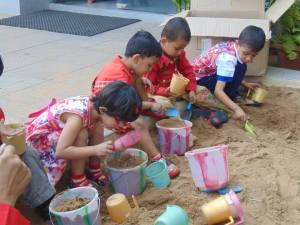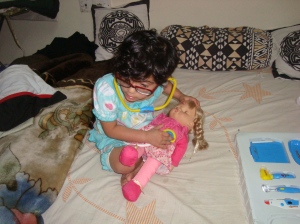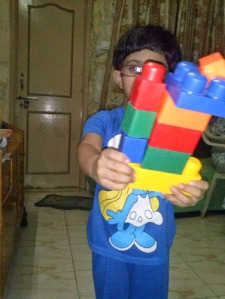It’s childrens day, and I thought today I shall share some information on how we can sustain the childhood for our children for long. These days children are going through problems that only adults faced, these range from health to emotional. Childhood diabetes, stress, anxiety, insomnia, fear etc. are just few examples of problems of todays children. So lets ponder over the following points, and remember that they are children till they’re adults!
1. Educate yourself- Psychologists all over the world are doing tremendous research on development during childhood. As parents and caregivers it’s important to always keep knowledge of children and their innate age-wise capabilities. This is important because it will help us not put too much pressure on the child. Familiarity with milestones is the key to providing the right care, responsibility, boundaries etc to your child. Resources like parenting magasines online or print are helpful, self-help books, or if you’re enthusiastic enough you could read texts books on life-span development, or child psychology.
2. Birth order blues- Children struggle greatly when a sibling arrives. Sibling rivalry is common, but what is even more common is bias treatment by parents and other adults. The little one no matter how old he gets will be the little one, the eldest no matter how young he is is burdened with being the elder. Take a second and think, no matter how much we try to not give in, we do compare our kids. And this lets others compare them openly too. This phenomenon is undeniably common in India. Unsolicited advice is the expertise of elder ladies, especially the grandparents. Remember that no matter how many kids you have, you have to treat them according to their age, not their birth order. It is not the responsibility of the eldest to be the role model, it’s the responsibility of the parents to be role models. Putting that level of pressure on a child will only make him aggressive, lose confidence in himself, become anxious and self-demotivating. Let me bring this into perspective, take a tiny moment, and ponder over this:
In class 2 at XYZ school, the students are all in the age bracket of 6-7years. There are two friends both who are 6 years of age, but R is he youngest amongst his siblings and T is the eldest amongst his. Both these kids are treated very differently at home. Yet, they’re both the same age, possess more or less the same capacities of normal 6 year old, have similar interests, want to play and be active. We need to start looking at the big picture here. Our children are what their age represents, it’s not their choice to be born first or second or third, or alone.
3. Let them play- It’s important to give exposure, set boundaries and schedules, equally important is providing child time to play. And this play shouldn’t be restrictive, it shouldn’t be like a class, it should be free play, the child should choose his/her toys/games, do whatever he wants to do, let them create that mess, help them clean up after wards, but don’t program their mind to believe being a “good” boy or a “good” girl means doing nothing you like. Parents are very concerned about play time, and regard it as useless, but that’s not the case. Children learn the fastest through play, and they show their true personalities and talents when they’re not being penalised for every choice they make.
4. The future adults- Children are the future of our society. They should be shown positivity when it comes to adulthood. Children who are surrounded by adults who are quarreling, or news that’s blasting about the horrible crimes committed, scare them. No child will look forward to becoming an adult if he starts associating negativity to it. Explaining to them about difficulties, and importance of faith, values, societal responsibilities etc will enable them to understand that life as adult will be challenging but it doesn’t need to be regretful.
5. No gender bias please- Snatching childhood from one genders not fair, girls are made to act older, more responsible from an earlier age. It is true that they emotionally and physically mature earlier, but that doesn’t mean they should start taking up adult like responsibilities. Responsibilities should be age and capability specific not gender specific. Simple chores like cleaning the room/closet, or helping set up supper shouldn’t be only a girls responsibility, the boys in the house too should help. Boys too shouldn’t be burdened with outside work, it’s good to allot some simple chores like a grocery run, but the house shouldn’t depend on a child, adults are the pillars of a home. Even while play girls should be allowed to play outside, just like boys. If the environment is unsafe for the girl, it’s unsafe for the boy too. They’re both precious and hold great relevance to your life, and none should feel they are inferior or superior to the other.
6. Look back- Make time to think about your childhood, what you liked and disliked, how you want to make the experience better for your children. Try to ponder over the methodology used to convey messages in your time, understand that not all are applicable in the todays world. Make a deliberate effort to bridge the generation gap between you and your children. Be humble enough to forgive, and stern enough to set boundaries, communicate and reason with logic.
I could go on and on, but the above 6 points are worth mentioning the most. Childhood is a very significant period of anyone’s life time, it’s the base or personality. Memories created and experienced at this stage have a lasting impression. Lets enable our children to have the best that they can, and have beautiful memories to give them hope for the future.




blogfhs
November 14, 2014 at 10:40 am
Reblogged this on .
SYED HASAN NAQI MOOSAVI
January 15, 2015 at 9:12 am
EVERYBODY CHILDHOOD DAYS ARE MOMORABLE IN OUR ENTIRE LIFE